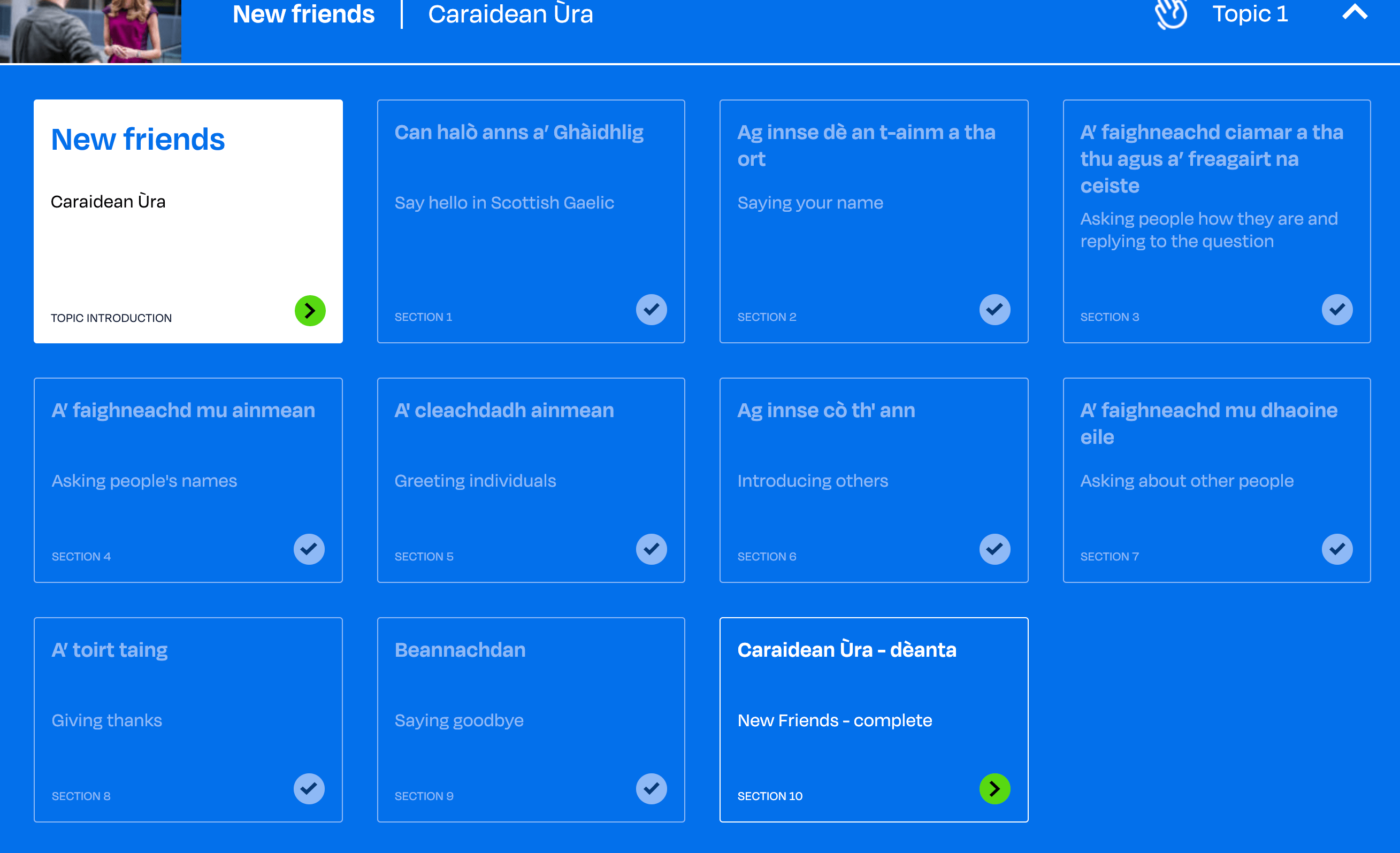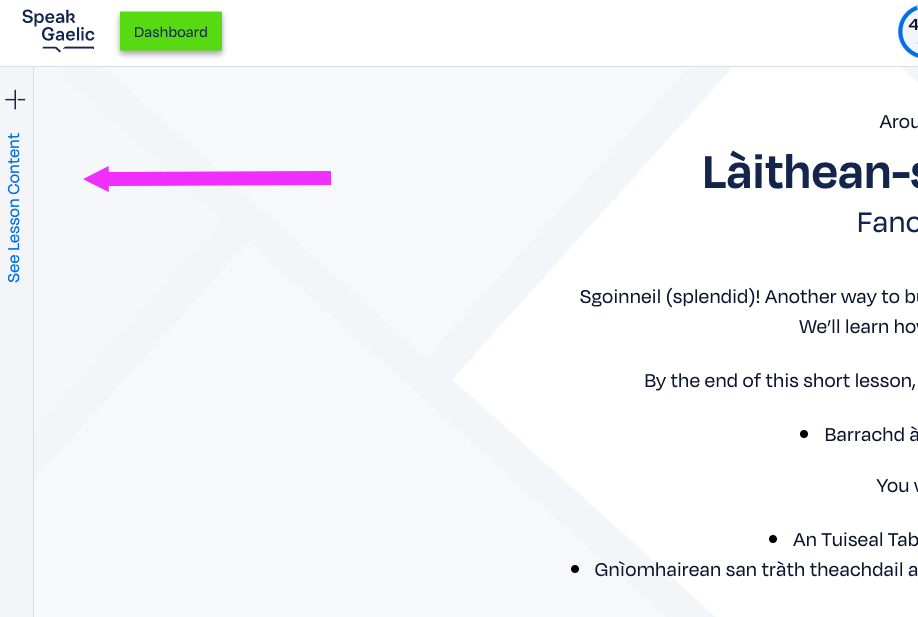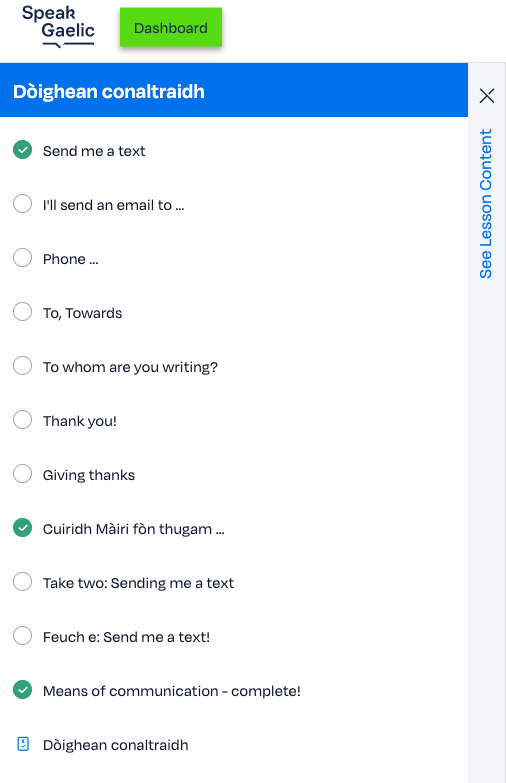Bilingual transcription: Dualchas
Bilingual transcription: Heritage
ETTA: Nach math gu bheil thu a’ faighinn dhachaigh a Mhìcheil. Agus nas tràithe na bha thu an dùil. Bidh do theaghlach toilichte d’ fhaicinn.
It’s great that you’re getting home Micheal. And earlier than you’d planned. Your family will be pleased to see you.
MÌCHEAL: Tha mo mhàthair air tòiseachadh ri fuine mar-thà, agus tha m’ athair gam thoirt gu Fèis nan Seanchaidhean. Tha seann duine gasta à Ceap Breatainn gu bhith ann. Tha seann sgeulachdan aige mu rudan mar shìthichean is manaidhean.
My mother has already started baking and my father is taking me to the Storytelling festival. An old man from Cape Breton will be there. He has old stories about fairies and omens.
ETTA: Bhiodh iad sin againne aig an taigh cuideachd.
We used to have them at home as well.
MÌCHEAL: Nach ann às an t-Seann Dùthaich a thàinig iad bho thus?
Didn’t they come from the old country originally?
ETTA: Chan eil càil nas fheàrr na stòiridh air a deagh h-innse.T
here is nothing better than a story well told.
MÌCHEAL: “Bha siud ann, o chionn fhad’ an t-saoghail…
Once upon a time…
ETTA: Neo…“Uair a bha siud, ann an dùthaich fad às…
Or… Once upon a time, in a place far away…
MÌCHEAL: Gus an ruigeadh iad an deireadh, “agus sin mar a chuala mis’ i!”
Until they reached the end, ‘and that’s how I heard it anyway!’
ETTA: A’ chiad sgeul air fear an taighe…
The first story from the host….
MÌCHEAL: ..’s gach sgeul gu latha air an aoigh.” ’S e na fireannaich a bu trice a bhiodh ag innse nan sgeulachdan anns an taigh-cèilidh
….and tales until dawn from the guest. It was mostly the men that would tell the stories in the ceilidh house.
ETTA: Bha tòrr òran obrach aig na boireannaich – airson a bhith a’ bleoghainn, a’ snìomhis a’ càrdadh, gun ghuth air na bha aca de dh’òrain luaidh.
The women all had lots of songs to work to –for milking, spinning, carding, not to mention the number of waulking songs they had.
MÌCHEAL: Bidh iad fhathast gan gabhail aig cuirmean is cèilidhean ann an Canada. Is toil le luchd-ionnsachaidh na Gàidhlig dualchas na Gàidhlig. Tha Sophie air a beò-ghlacadh le na seanfhacail agus na gnàthasan-cainnte.
They still sing them at gatherings and ceilidhs in Canada. Gaelic learners like Gaelic culture. Sophie is obsessed with Gaelic proverbs and idioms.
ETTA: Agus tòimhseachain. Feuch an tomhais thu dè tha seo… Thèid ia-null air an abhainn… ’s thig i a-nall air an abhainn. Innsidh i sgeul ’s cha chan i fhèin guth!
And riddles. Try and work out what this is… It goes over the river, and it comes back across the river. It tells a story and it doesn’t say a word.
MÌCHEAL: Chan eil càil a dh’fhios a’m! Dè th’ ann?
I have no idea. What is it?
ETTA: Litir!
A letter!
MÌCHEAL: (reacts appropriately) Is toil leamsa na h-abairtean mar, “cho coltach ri chèile ri dà sgadan!”
I like the expressions such as, “as alike as two herring”.
ETTA: Agus Am fear a ghoideadh an t-ugh, ghoideadh e a’ chearc! Dè mu dheidhinn sloinnidhean? A bheil muinntir “na dùthcha ùire” a’ cumail nan sloinnidhean?
And The man that would steal an egg, would steal a hen! What about patronymics? Do folk from the ‘new country’ use patronymics?
MÌCHEAL: Bha na seann daoine gan cumail suas. Rachadh cuid air ais sia no seachd de ghinealaichean. Is mise Mìcheal mac Mhìcheil, ‘Ic Ruairidh, ‘Ic Sheumais, ‘Ic Iain.
The older folk kept it going. Some would go back six or seven generations. I’m Micheal, son of Micheal, son of Ruairidh, son of Seumas, son of Iain.
ETTA: Dè cho fad ’s a bhios tu thall ann an Alba Nuadh?
How long will you be over in Nova Scotia?
MÌCHEAL: Chan eil mi cinnteach fhathast. Mar a chanadh sibh pèin, bidh mile “cas a’ falbh agus cas a’ fuireach”!
I’m not sure yet. As you would say, I’ll be in two minds as to whether to go or stay.
ETTA: Tillidh tu ge-tà?
You’ll return though?
MÌCHEAL: (He doesn’t want to answer the question)Thugnaibh agus ceannaichidh mi glainne fìon dhuibh, agus faodaidh sibh tòimhseachan eile a chur orm!
Come on and I’ll buy you a glass a wine, and you can try another riddle on me!




